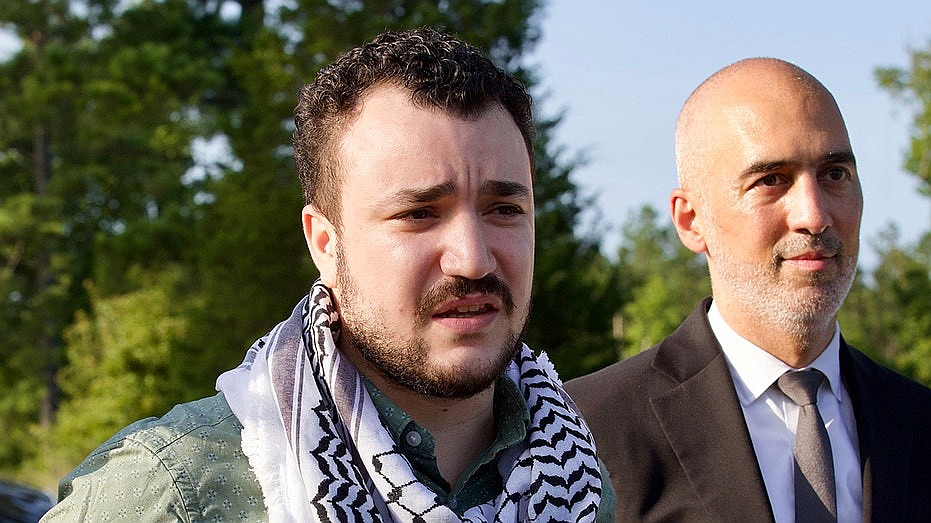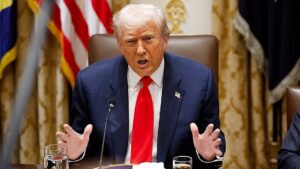DOJ argues judge’s decision blocking Mahmoud Khalil’s removal was ‘indefensible’
In a contentious legal battle, the U.S. Department of Justice (DOJ) is urging the 3rd Circuit Court of Appeals to overturn a lower court ruling that blocked the detention and removal of Mahmoud Khalil, a prominent activist and lawful permanent resident. During a hearing on Tuesday, DOJ lawyer Drew Ensign argued that the New Jersey district court, which sided with Khalil, lacked jurisdiction over the case and that the habeas corpus petition filed by Khalil was an inappropriate means to contest his detention. Ensign contended that immigration courts, under the DOJ’s oversight, are the proper venue for such cases. He described the district court’s injunction as “indefensible,” asserting that the appellate court should reverse the lower court’s decision to maintain the integrity of immigration law processes.
Khalil, a Columbia University graduate known for his vocal opposition to the Israeli government, has been embroiled in legal troubles since March when the DOJ accused him of violating immigration laws due to his political activism and alleged sympathies with Hamas. His detention was initially ordered by an immigration judge, citing national security concerns related to his speech. However, in June, Judge Michael Farbiarz, appointed by President Biden, ruled in favor of Khalil, stating that his First Amendment rights were infringed upon and ordered his release on bail. The case has drawn attention not only for its implications on Khalil’s future in the U.S. but also for the broader question of noncitizens’ constitutional rights and the limits of governmental power in immigration matters.
The complexities of Khalil’s case are heightened by the rapid developments surrounding his detention, which saw him moved between states, complicating his legal representation’s ability to respond effectively. One appellate judge acknowledged the challenges faced by Khalil’s attorneys, suggesting that their decision to file a habeas corpus petition in New Jersey was reasonable given the uncertainty of Khalil’s location during his swift detention. As the appellate court deliberates, the outcome remains uncertain, but it could set a significant precedent for how courts handle cases involving noncitizens and their rights in the face of governmental actions. The judges did not specify when they would issue a decision, leaving Khalil’s fate hanging in the balance as the legal community closely watches this evolving case.
Related articles:
– Link 1
– Link 2
A
Department of Justice
lawyer argued to an appeals court on Tuesday that a lower court’s decision to block activist Mahmoud Khalil’s detention and removal was “fundamentally flawed” and should be reversed.
DOJ lawyer Drew Ensign’s arguments came as he faced pointed questions during a hearing from the U.S. Court of Appeals for the 3rd Circuit in a turbulent months-long court case centered on noncitizens’ constitutional rights.
Ensign said the New Jersey district court that sided with Khalil did not have proper jurisdiction over Khalil’s case and that Khalil’s habeas corpus petition was not the right vehicle to challenge his detention and removal. Ensign said the immigration courts, which are under the purview of the DOJ, were the correct venue.
“Habeas is the path the petitioner has chosen, and the district court indulged that unlawful detour by issuing an indefensible injunction,” Ensign said. “This court should reverse.”
FEDERAL JUDGE SIDES WITH ANTI-ISRAEL RINGLEADER MAHMOUD KHALIL, HALTS TRUMP ADMINISTRATION’S DEPORTATION BID
Khalil, a Columbia University graduate who became a ringleader of campus protests against the Israeli government, has been fighting to stay in the United States since March, when the DOJ first accused him of violating
immigration laws
because of his advocacy for Palestine and perceived sympathy for Hamas terrorists.
Khalil, who is a lawful permanent resident, was arrested at the time and deemed removable by an immigration judge because of what the Trump administration said was speech that was at odds with the United States’ national security posture.
In June, Judge Michael Farbiarz, a Biden appointee based in New Jersey, blocked the immigration judge’s decision, saying Khalil’s First Amendment rights were violated, and the judge ordered Khalil released on bail.
ANTI-ISRAEL ACTIVIST MAHMOUD KHALIL CLAIMS OCT. 7 TERROR ATTACK WAS ‘DESPERATE ATTEMPT’ FOR GAZA TO BE HEARD
In a subsequent order, Farbiarz also took issue with an immigration judge’s new decision, which found Khalil was removable based on a newer allegation by the Trump administration that Khalil fabricated information on his green card application. Khalil’s lawyers are now separately challenging that claim.
Ensign, who has been arguing on behalf of the Trump administration in several controversial immigration lawsuits, accused Khalil’s lawyers of attempting to bypass immigration laws, which have established a process where immigration courts can make decisions about deportations and defendants can appeal those decisions.
Khalil’s lawyers are attempting to “circumvent the carefully designed and articulated scheme that Congress has created for judicial review,” Ensign said.
One judge on the three-judge panel that heard the case on Tuesday said Khalil’s attorneys should not be faulted for filing a habeas corpus petition in New Jersey in March because they did not know their client’s true location at the time. Khalil’s arrest and detention took place over a whirlwind few days, where he was detained in New York, moved to
New Jersey
, then moved to Louisiana.
“The lawyers didn’t know,” the judge said. “They had to prepare for the worst. What else do they do, unless we’re creating a black hole of jurisdiction?”
The appellate court judges did not say when they would make a decision, but one could come at any time.
Eric
Eric is a seasoned journalist covering US Politics news.



